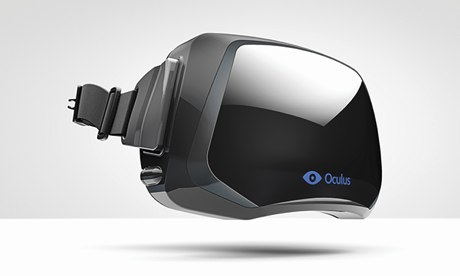
We were supposed to have virtual reality by now. We knew from fiction what it would look like, the wrongs it would bring.
For ages we seemed on the edge of a self-imposed Matrix or as much creepy, blobby lovemaking as we wanted, as in The Lawnmower Man.
But for a host of technical and practical reasons, little of merit has materialised until the recent announcement of Oculus Rift, a headset financed by the crowd-funding website, Kickstarter. The headset's existence has been made possible in an online virtual world by a now solvent generation promised it by their movie virtual worlds 20 years ago. And so fantasy has become reality has become fantasy reality.
Although I love gaming, I have never had a longing for VR. Like many people, my kneejerk response to technology created after I've turned 30 is to fear it will be socially detrimental and fundamentally sad. But of course I'd love a Star Trek: The Next Generation holodeck. And what is that if not virtual reality? Creating an environment and interacting with it recreationally is pretty much what we do anyway, except we store those environments behind a screen.
I think the reason virtual reality troubles us is more basic than that. Maybe it's because it covers people's eyes. When you see YouTube clips of people playing Oculus Rift it seems at first silly, then slightly sinister. You cannot connect or commune with the player as you watch them play. No point of view is shared. The windows to their soul have their curtains drawn. In fact, with a solid black mask strapped across the face, players look like the villains we're often encouraged to shoot. Anonymous. Alien.
But that's only the view from the outside.
I was kindly offered a go on Oculus Rift at the offices of gaming company Six to Start in London. It's very early days in terms of game design and on this occasion motion was still operated with a keyboard, mouse or controller. I put on the mask, not too heavy but well built, and powerful headphones over that. I was instantly immersed. Two screens, one for each eye, made a single 3D image before me, and then, I realised, around me too.
I was in a castle environment. The resolution isn't that high so things looked blocky, but much better than I expected. The field of vision is excellent. As I moved my head I could see all around me, the angle changing naturally, as in life, with a small amount of image blur. Look Mum, no edges. I was struck by how false, distant and controllable our interactions with screens are. They seemed like cluttered frames that present thin, faraway worlds we can point at, toy with. This was different. I felt like I was in the orchestra, rather than conducting. We accept it as normal now to have at least one glowing square in our field of vision that beams out a completely different image from its surroundings. That is what is strange. Virtual reality, weirdly, seems more normal.
I moved out into the gardens; green, expansive and airy. When I looked up, the world continued. When I looked down, it carried on too. And I cannot explain the total, devastating wonder of turning to look over my shoulder and the same world being there too. Something happened. My body and my mind accepted it and relaxed.
I played Half-Life 2, a familiar shooter, and the intensity was extreme. Small rooms felt claustrophobic, but truthfully so. Outside spaces felt expansive and inspiring. It is almost as if the emotions that horror attempts to elicit on the big screen could be created genuinely here, not enacted by proxy. I felt in danger when an enemy attacked me. And that improved the experience. I began to get that creeping, unsteady feeling when you realise something is "game changing". Or maybe it was just the motion sickness.
This brings me to one of the more unnerving aspects of Oculus Rift. No matter how many false enemies fought, virtual reality makes the user tremendously vulnerable. With my senses covered and my mind engaged elsewhere, I couldn't help but think how I would feel about playing it for long stretches alone.
But my most profound experience with the Oculus Rift hadn't happened yet. It didn't happen until eventually the game was over and I reached and took off the headset, removed the mask. As I lifted it off, it felt like nothing I've ever experienced. Sensation assaulted me, the pinprick resolution, the fluidity of free motion, a real voice caressed me. It was like seeing the sea again after a long time.
Oculus Rift is a brilliantly achieved piece of kit. There is no single future of gaming, I hope, but this is going to be among the next array. With creators like John Carmack (Doom, Quake) joining in a leadership capacity, the omens are very good. It will be perfect for gun games. But it could have therapeutic, emotional and educational potential that we are yet to imagine. And as I lifted the set from my face, over my head and my own world streamed through me, I wondered if its genius is also in what it shows us when removed. I'm home. I won.

